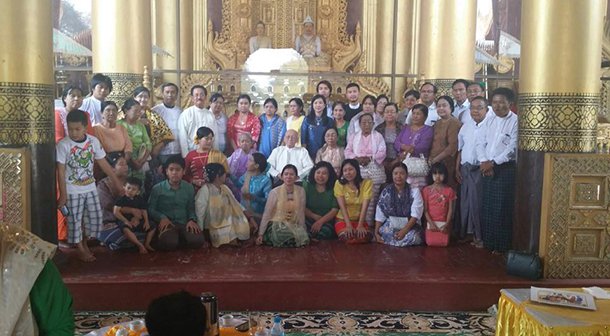Descendants of the Konbaung Dynasty, Burma’s last royal family, offered meals to monks and made merit on behalf of their late ancestors at the Mandalay Royal Palace on Sunday, for the first time since King Thibaw was forced to abdicate the throne in 1885.
Thibaw, the Konbaung Dynasty’s final king, was exiled to India by the British along with his wife Supayalat and children. The dethroned king died in 1916, aged 57, in exile.
In December 2012, President Thein Sein visited the grave of Thibaw in India, making him the first head of Burma’s government to visit the site.
Deputy Minister for Culture Than Swe helped organize the offering of meals at the palace over the weekend.
Taw Phaya Naung, a descendant of the dynasty’s Crown Prince Kanaung, told The Irrawaddy: “Previously, we could only make offerings [for our ancestors] at pagodas and monasteries. But this time, with the deputy minister’s participation, it can be considered a state-level [offering].”
However, Than Swe sought to distance the government from involvement in organizing the event.
“It was not arranged by the government, but by me with the permission of the Culture Ministry. I offered meals with the honorarium I got for writing articles and books. I arranged it because I felt a longing for them [the deceased kings],” he said.
Descendants of other Konbaung Dynasty monarchs including Alaungpaya, the founder of the Konbaung Dynasty and the Third Burman Empire and Bodawpaya, who was the son of Alaungpaya and a powerful king, were also present at the meal-offering ceremony.
The Konbaung Dynasty spanned 11 monarchs and ended with Thibaw’s dethroning in 1885.
On March 17, 1945, the Mandalay Royal Palace, which was built by Thibaw’s father King Mindon, was reduced to rubble during a British air raid against the occupying Japanese. The 89 main halls of the palace were rebuilt and construction was completed in 1996.
Previously, visiting the palace was restricted by Burma’s former military regime.

















